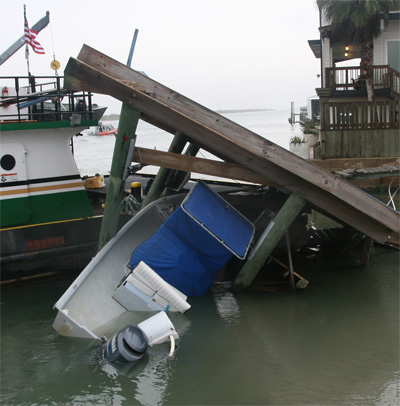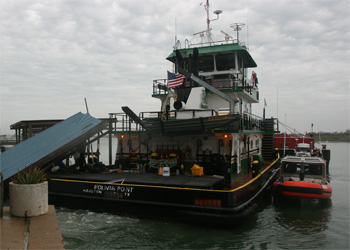The captain of a tugboat that destroyed a boathouse on the Gulf Intracoastal Waterway in Texas was trying to free a grounded gasoline barge when he lost control of the vessel, the U.S. Coast Guard said.
A strong tidal current likely contributed to the tug’s accident, which occurred on Feb. 16 near the Texas town of Port O’Connor. The collision caused an estimated $150,000 in damage to the boathouse, pier and recreational boat, according to the property owner.
“What the captain of vessel stated was that the cause of the (accident) was due to tide. He wasn’t able to control the tug with the strong tide cutting through,” said MST1 Chris Champeau, from Coast Guard Marine Safety Unit Victoria.
 |
|
Jay Lack |
|
A docked powerboat is damaged and partially sunk as a result of the accident. |
Nobody was injured, and there was no environmental damage aside from an oil sheen that formed from the damaged powerboat’s engine.
The 2,000-hp Bolivar Point was headed toward Houston in the Intracoastal Waterway pushing two 298-foot barges loaded with 50,000 barrels of alkylate — essentially a high-grade gasoline — when it encountered fog on the evening of Feb. 15.
Champeau said the tugboat captain elected to push up onto the soft banks on the Intracoastal Waterway near mile marker 474 shortly before 2000 on Feb. 15 to let the fog pass overnight. The accident occurred at about 0530 the next morning, when the captain was maneuvering to pull the front barge off the bank.
“The bow of front barge was stuck and the current pushed the tug, and the captain maneuvered the tug and barges so that he blocked entire channel (then swung around) and hit the boathouse,” Champeau said.
He added that the vessel swung like a pendulum across the channel before running into the boathouse.
“The captain said was using both screws on the engine … but he couldn’t control it enough. As he got closer to other side of bank, the water gets shallow. He stated that the engines began to overheat due to shallow water,” Champeau said. “He kept losing the engines, and that caused him to … completely destroy the dock.”
John Costello, manager of safety and vetting for Higman Marine Services, the Houston-based operator of Bolivar Point, said neither the barge nor the tug was damaged in the incident. He didn’t dispute the Coast Guard’s version of events.
“Basically, what happened was, the current caught the tow and pushed it basically down on the boathouse,” Costello said. “Whose fault is it? It’s pretty clear to me whose fault it is, and it’s clear to everybody else without saying anything more.”
Costello said the boathouse was destroyed, but the boat that was stored inside it was not seriously damaged even though it was found partially underwater after the accident.
Jay Lack, a businessman from Victoria, Texas, owns the boathouse and several other piers as part of his 400 feet of frontage on the waterway. He disputed Higman’s claims that his 22-foot powerboat was not damaged.
“The boat is not OK,” Lack said, adding that the incident caused about $150,000 in property damage in all. “The boathouse, the boat and the motor we think are completely gone, according to the insurance people.”
Lack said Higman has been “very cooperative” thus far, but that he hired lawyers to “make sure they got on the stick.”
Almost a year ago, a different barge ran into several of the piers that extend from his property in Port O’Connor. Lack said he is still trying to get compensation from the barge company for that damage. A lawyer Lack hired about a week before the Bolivar Point episode is now involved in both cases, he said.
Champeau said the Coast Guard closed the Intracoastal Waterway for several hours between mile markers 473 and 475 while the salvage occurred.
Tidal changes pulled the tugboat off the boathouse. A crane was brought in to remove its remains from the waterway, and Higman arranged for Lack’s boat to be taken to a nearby boatyard.
Champeau personally inspected the tugboat and determined it could continue to Houston after it performed well on “multiple steering operations.” Although an assist tug arrived, the Coast Guard allowed Bolivar Point to pull both fuel barges to Houston.

